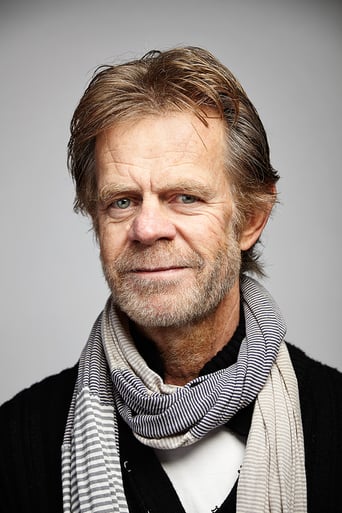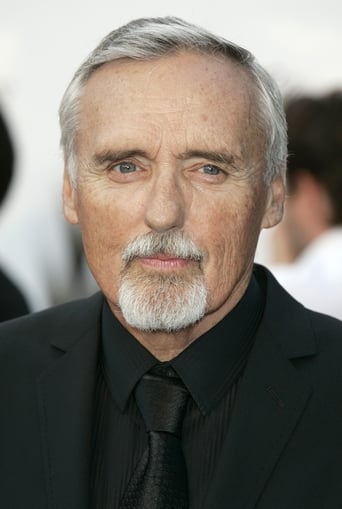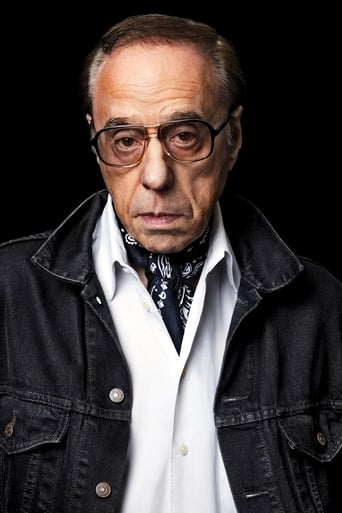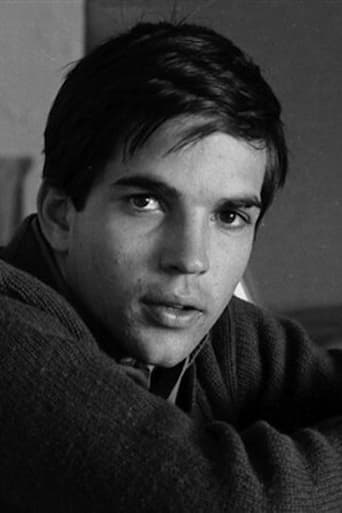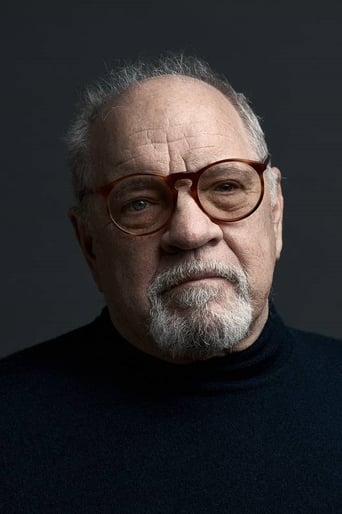Lovesusti
The Worst Film Ever
Phonearl
Good start, but then it gets ruined
PiraBit
if their story seems completely bonkers, almost like a feverish work of fiction, you ain't heard nothing yet.
Casey Duggan
It’s sentimental, ridiculously long and only occasionally funny
Rodrigo Amaro
My impression of this documentary wasn't so great due to the fact of already seeing and knowing a similar themed work a few years ago called "A Decade Under the Influence" (2003), directed by Ted Demme and Richard LaGravenese, which was a better project for numerous reasons. I enjoyed "Easy Riders, Raging Bulls" for all the information that wasn't present in the other film but that's it.Narrated by William H. Macy, the movie presents a panorama of the New Hollywood, the generation of artists, directors, writers and even actors who gave a fresh air to the decadent old system of Hollywood, which was losing space and audience because of television's quality. People weren't going to the movies but after 1967 this started to change drastically when those rebel and young folks decided to make their revolutionary, controversial films inspired by what was going on in foreign cinema and movements like Nouvelle Vague, the Neorealism etc. Coppola, Lumet, Lucas, Spielberg, Scorsese, Altman, Cassavetes and others who made dynamic, powerful, explosive and box-office hits that molded how Hollywood is today with movies that now are true classics like "Jaws", "The Godfather", "Dog Day Afternoon" and many more. As established in both documentaries the period goes between 1967 and 1980, ending with the abysmal failure of "Heaven's Gate" putting studios in charge of the movies again, rarely giving final cut to the auteur.Based on a highly controversial book written by Peter Biskin, the film is filled of conjectures, gossips and speculations. Since most of the famous names like Spielberg and Lucas aren't here to present their side of the story (they're also absent in "A Decade..."), and even with reliable sources who were part of the movement giving their testimonies, this seems lacking in authenticity (the wild parties; or Brian DePalma disbelief in the effectiveness of "Star Wars" just to mention a few). There's good interviews with Karen Black, John Milius, Paul Schrader, Michael Philips and others who were part of the movement but a lot of absences here (they declined interviews for this particular project but accepted for "A Decade...", like Robert Altman for example).To me, the most fascinating aspect of the film was the explanation of the group's downfall (very few directors escaped from making flops after flops). There's a female producer who said something about how the box-office race affected the industry. If at one time studios were concerned about the product and the quality of it, now it's a money grabbing race just like the horse tracks.If viewed before "A Decade..." (which, again, is so much better developed) you might enjoy it more than I did. It's an entertaining piece, somewhat objective and a good source of information for starters in becoming familiar with the New Hollywood and their movies. 8/10
moonspinner55
After 20th Century-Fox's "The Sound of Music" raked in big box-office and Academy Awards, every Hollywood studio was busy for the next couple of years trying to duplicate its success (it isn't specified here, but Fox itself was one of the hungriest at pilfering from this genre). Unfortunately, "The Sound of Music" was really the end of the popular, old-fashioned, break-out-in-song Hollywood movie, giving way to the rebellious counterculture. Seen as a major turning point--and released before "Bonnie & Clyde"--"The Wild Angels", a Roger Corman biker flick from A.I.P. (which came out one year after "The Sound of Music"), signaled a change in perceptions. The studio system was breaking down and actors were no longer on contract (since the youth movement didn't exactly want pretty stars). Most young, hungry American movie makers of this period took their cues from the European directors of the early '60s, and this documentary chronicles their battles with the ever-present Hollywood regime into getting their avant garde movies made, marketed and released. Most of the movers and shakers from the past are here, looking quite good, and their recollections from this fertile period for thought-provoking entertainment are fascinating. The downfalls (the drugs, the egos) are documented in a matter-of-fact way, nobody is chastised or condescended to, as the rise of the summer blockbuster (Steven Spielberg's "Jaws") heralded the weakening of the character-driven drama. This film does make it seem as if the smaller, more personal Hollywood motion picture is completely dead now, but fails to take into consideration terrific films like "Sling Blade" or "Monster's Ball" which, high profile or not, give serious movie-fans hope for the future. But as a chronicle of this golden era, "Easy Riders, Raging Bulls", narrated by William H. Macy, is fairly straightforward, mostly accurate, very entertaining, and a great tool for film buffs who weren't privileged to have been there. *** from ****
jpschapira
There was a great and truly improving decade for Hollywood; the 70's. Many think, and I probably agree, that the best cinematographic decade took place in the nineties, but, even if we want it or not, the directors of the nineties started making films in the 70's. Kenneth Browser's documentary, narrated by William H. Macy, tells how these directors emerged."The secret of making a film is just saying that you'll make it", said in his twenties a director the documentary refers to as "the man who would be king". That's Francis Ford Coppola, who made movies even if the studios didn't want him to. His is one of the many stories we meet, but we doesn't meet him; he doesn't talk in the documentary. We know "The Godfather" was seen by many people, but Coppola doesn't tell us that.Peter Bogdanovich does tell his story. His wife talks, about when they were filming "The last picture show", and about the close relationship he had with Cybill Shepherd, probably an affair. He was one of the various directors who were more important than the studio and producers. When a director could do things right, he got authority. William Friedkin, who made two successes in a row, gained authority too.You can't say much about the documentary. It is good, it tells its story correctly, but the thing is that there are no actors, no choreography; everything is real. And we believe Dennis Hopper when he says he was stoned as he shot "Easy Rider", and we believe Kris Kristofferson when he says Sam Peckinpah went down too many times, we believe Julia Phillips when she says she was bad.I came to find out what they call now B-Movies, like "Jaws", the first movie to make 100 million in the box office. Then a bunch of B-Movies came, just with the objective of winning money. The thing is, they were greatly done in some cases, by A-Directors, if you get what I mean. Steven Spielberg was a kid, and made his TV film "Duel", and started improving technology…You know what came later on. So, when Coppola's apprentice George Lucas showed a raw version of "Star Wars" to the industry, and no one liked it, Spielberg said: "You're going to make millions". You know what happened.We meet many more also. There's Arthur Penn, and therefore how good was Warren Beatty with his money and his way of controlling directors. There's Robert Altman, who could be the only star in one of his films, which caused him many problems, and successful films between 20-years periods. There's Roman Polanski, who's considered a fugitive, but lost his wife in the States, because of his uncontrolled life. She had a baby inside. Then he made, in his own vision, "Chinatown", starred by another influential actor, Jack Nicholson.Richard Dreyfuss talks, so does Peter Fonda. Jonathan Tapin says he got money to produce a film, from a not influential director, which starred his friends and dedicate and passionate actors; Robert De Niro and Harvey Keitel. This movie was "Mean Streets". During a showing an important producer left his seat and Tapin: "Oh, he doesn't likes it, he's leaving". Then this producer got near Tapin's seat, and said to him: "This is the best film I've seen this year, but I have to go to the bathroom; can you stop it?" Paul Schrader tells the camera about his period of loneliness, when he was going nowhere, and although not as affected by drugs and alcohol as the rest, he took a rest. He was one of the "nerd" guys, as they described them. When everybody when to the Phillips' house to get high, Spielberg, Schrader and Coppola where guys that enjoyed chatting about movies. So it occurred to Schrader the idea about the taxi driver. So when he wrote his next script, he couldn't find a director. "Direct it yourself", his friends told him. But for some reason, that special director of "Mean Streets", who was always willing to do the original, and that actor who had already won an Oscar for "The Godfather", were the people for the project.This is how Robert De Niro and the director I haven't said the name (you know who he is) teamed up again for "Taxi Driver". Coincidentally, after the 70's ended, all the other pioneers were steady and that passionate director Marty Scorsese wanted to quit his career, encouraged by Bob De Niro, he have one last shout. This is when we see one scene from "Raging Bull", and the beginning of another history, that is the 80's.
rmc65
This is a great look at Hollywood in the 1960's and 1970's. If you hadn't already noticed, that was an era of great American films, and "Easy Riders, Raging Bulls" tells you how and why. The interviews and narration are awesome, and I love seeing all those old movie posters and clips. There may be a few independent filmmakers missing from this piece, but it's impossible to cover them all in just 2 hours. Plus, the thesis of this film deals with the major studios and how talented YOUNG artists briefly took control and made cool movies with studio money. I only wish the industry was like that today.

